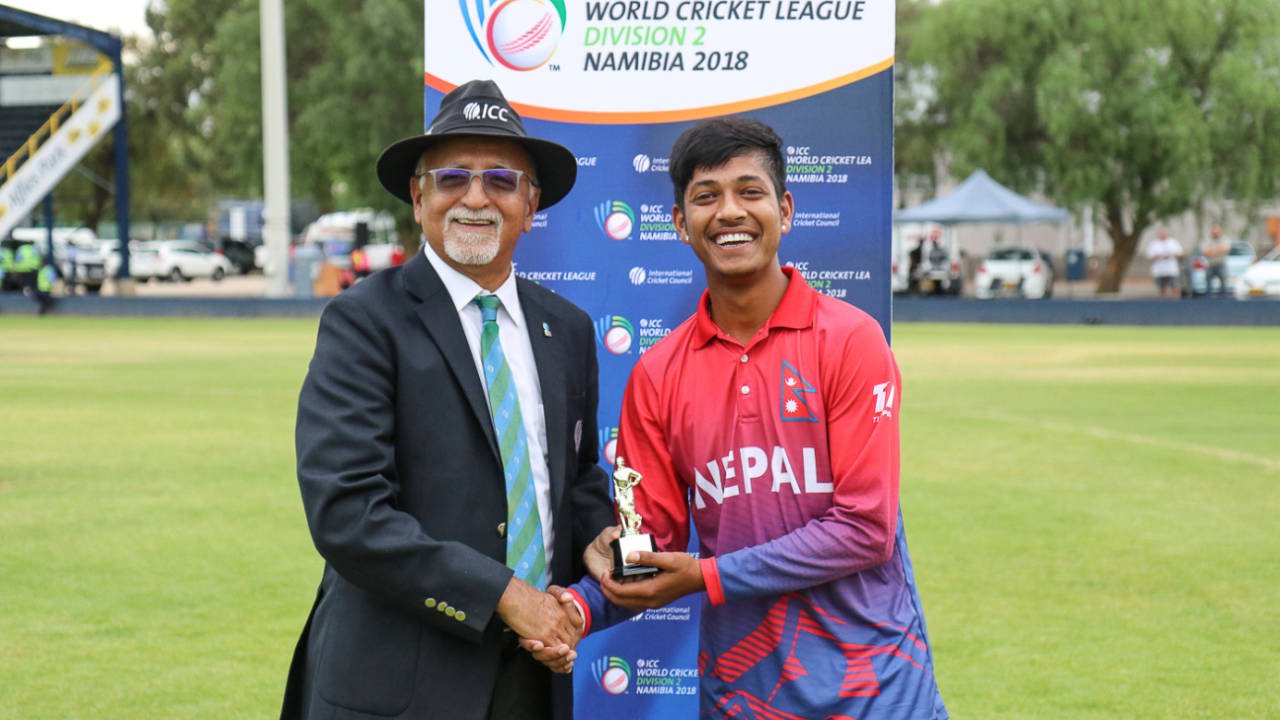Sandeep Lamichhane, Nepal's first global T20 icon
'If I can do it, you can too' is the 18-year old's message to Nepal's next generation as he reflects on his journey
Umar Farooq
01-Mar-2019
Sandeep Lamichhane receives his Man of the Match award from ICC match referee Dev Govindjee • Peter Della Penna
A majority of Nepal's 25 million population lives and breathes cricket. Yet, very few have traversed the distance 18-year old Sandeep Lamichhane has. Closing in on three years since his senior international debut against Namibia in April 2016, he's already become a household T20 name, having played in leagues across India, Pakistan, Australia, Canada, Hong Kong, the UAE and the West Indies.
The journey to get there hasn't been easy. The first step, also the biggest, was to convince his parents that cricket won't ruin his childhood. "My parents wanted me to be good student so that I can earn some good money," he tells ESPNcricinfo in Dubai, where he's playing for Lahore Qalandars in PSL 2019. "But I had different ideas and I asked them two-three years for myself."
To join an academy, he left his parental home and moved in with his married sister and her in-laws. Having taken the first step towards becoming a cricketer, Lamichhane soon found out there was much more he needed to do. It involved waking up early and reaching the ground well before the regular trainees arrived.
"I didn't get much time with coaches in my earlier days because there were a lot of other boys too during the regular hours of academy from 4pm to 7pm. So I used to go earlier at 12 noon to get more time in nets and with the coach. I wanted to be different from others to be noticed and I knew I needed to work very hard. I trained for 6-7 hours every day."
In wanting to be different, he chose legspin - not entirely unique as a craft, but certainly among the more challenging disciplines. Lamichhane was a natural, who used to bowl the legbreak and googly, but couldn't land them at the right spot. This struggle to find consistency resulted in those long hours at the nets, especially because match time was far and few.
"When I used to play for fun near my sister's house, I remember a boy's mother coming up and telling me to not spoil her son's life by playing cricket. The same mother came up to me recently and encouraged her son to play with me."
Around the time Nepal were looking to select their Under-19 World Cup squad ahead of the 2016 edition in Bangladesh, Pubudu Dassanayake, then Nepal's coach, visited Lamichhane's academy scouting for talent. He was immediately impressed with what he saw. Next thing Lamichhane knew, he was among the tournament probables.
"It was unbelievable for me because there was a time when I wasn't getting the opportunity and suddenly I was in the U-19 World Cup probables camp," he reflects. "I knew I had a long way to go, but the real challenge of playing for the senior team started from there on."
Lamichhane was the second-highest wicket-taker in the tournament, with 14 wickets and a best of 5 for 27 against Ireland. A few months later he was invited to play for Kowloon Cantons in the inaugural Hong Kong T20 Blitz. It was there that Lamichhane found himself playing alongside Michael Clarke, Australia's World Cup winning captain, who was impressed enough to invite him to play for Western Suburbs, the Sydney-based club. Things have looked up since.
Last year, he played a key role for Nepal at the World Cup Qualifiers in Zimbabwe, where they finished eighth to earn ODI status. He went to the IPL and played for Delhi Daredevils, now Delhi Capitals, under head coach Ricky Ponting. While he didn't start, he impressed towards the back end of a disappointing campaign and has been retained ahead of the upcoming season. He'll look to carry his PSL form there, having picked up 10 wickets in four games so far.
Lamichhane's journey is closely being followed back home, and he hopes to inspire youngsters. His main concern is Nepal's cricket infrastructure and an administration that is in shambles - Cricket Association of Nepal is currently suspended - resulting in ICC cutting off funding. For the moment, the ICC essentially manages the running of cricket along with an interim administrative body. This suspension, however, won't affect Nepal's participation in ICC events.
"It's great to be an inspiration and give back to my people that believe that this game can get their sons somewhere," he says. "Representing your country is a dream come true and I would love to see more boys coming into the game with a belief that they can do something with their life.
"When I used to play for fun near my sister's house, I remember a boy's mother coming up and telling me to not spoil her son's life by playing cricket. The same mother came up to me recently and encouraged her son to play with me. I have tears recalling that and the tough times."
"There is not much investment into cricket in our country, but the love for the game is huge. If this happened in any other country, players would've quit playing. But here, despite hardships and no real prospects, players are pushing themselves only for the love for the game."
Umar Farooq is ESPNcricinfo's Pakistan correspondent

